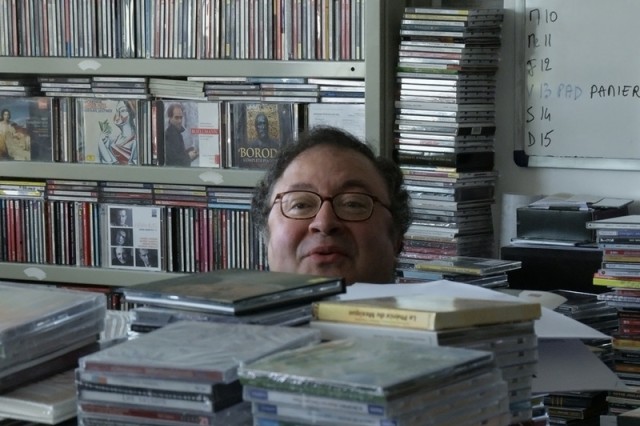 CLASSICAL MUSIC GUY HAPPY WITH HIS ORGANIZED CLUTTER IN THE HOUSE OF RADIOBrilliance, with a thing or two lacking
CLASSICAL MUSIC GUY HAPPY WITH HIS ORGANIZED CLUTTER IN THE HOUSE OF RADIOBrilliance, with a thing or two lackingNicolas Philibert is a great documentary filmmaker. But he may never find another subject so ideally suited to his meticulous observational skills and so easily able to melt his slight chilliness (a failing perhaps much incident to the art: the great Frederick Wiseman has it too) as the first-graders at the little one-room mountain school he filmed for a year for the heartbreaking and profound documentary masterpiece,
To Be and to Have (Être et avoir). A chill sets in again in Philibert's next project,
Nénette, which studies, with a mixture of sympathy and irony, a 40-year-old orangutan who's been on view in a Paris zoo for most of her life. With
The House of Radio, a different problem arises. "La Maison de la Radio" refers to the big circular building in the 16th arrondissement in Paris that houses Radio France, the state broadcasting company, which has seven networks and many more stations. The great institution, the teeming hive, that is French public radio is an almost impossibly complex subject that lent itself to a brilliant orchestral blend of image and sound, and Philibert gives us a truly virtuoso performance of filming and editing that only he could do. But something is missing. Philibert flits from person to person, department to department. The result is great as rhythmic, abstract cinema. But this is an institution. Its expert staff deserve more in-depth examination. And its issues and conflicts needed dissection. But Philibert doesn't go that deep.
The House of Radio, which begins with the big round shiny building and employes briskly coming in to work, shows us a great institution, and it's a joyous celebration of French intelligence and high standards. We see editors and section chiefs performing subtle editing feats and teaching new recruits the tricks of presenting a news flash that's smart and tight. And there's music, and teeming rounds of morning news, and all kinds of stuff, which Philibert transforms for us by showing us images behind what for listeners has never been visual before. But
Cahiers du Cinéma's Ariel Schweitzer pointed out in his review of this film that certain departments of French radio, notably France Inter and RFI, have recently undergone profound crises; yet Philibert says nothing of that.
After a while we begin to see that Philibert is manipulating images and sound largely for their own sake. His
House of Radio (Schweitzer again) "is terribly lacking in dialectic, tension, or real involvement." Ultimately this film is (says Pascal Mérigea in
Le Nouvel Observateur) "stylish, accomplished and astute, and also slightly lazy." We wind up feeling that (as Pascal Mérigea writes in
La Croix ) this film, which excites, impresses and delights us at first, doesn't teach us anything, and doesn't surprise us either. There's also no sense of how this beehive of activity on Paris' Avenue President Kennedy engages with the public; it seems to perform only for itself.
Philibert is no ordinary filmmaker, and
The House of Radio, elaborately edited, without commentary, is an elegant, superbly composed sort of twittering machine of a film about sound waves that are delivered to a nation and the great team of pros who produce them. But it seems in the end that a much more ordinary kind of documentary -- one where people got to talk about their jobs and their lives, history was presented, and the public got heard from -- would actually have satisfied us more. This documentary is a brilliant achievement that is also a massive disappointment. French public radio turns out to have been the wrong subject for Philibert. It is just too complex and multi-layered a subject to produce the kind of rich emotional message Phlibert's careful filming of the school kids, or even his patient observation of the orangutan, was able to yield.
La maison de la radio, 99 mins., debuted at Berlin Feb. 2013, opened in French cinemas 3 Apr., where it did well critically (
Allociné press rating 3.6) despite the negative notices I quote. It opened in NYC 4 Sept. (see Manohla Dargis'
NY Times review from that time). Not so well received here: Metacritic rating 56. Screened for this review as part of the San Francisco Film Society's series, French Cinema Now, Nov. 2013, presented Nov. 7-10 at Landmark's Clay Theater. It was to have been included in Rendez-Vous with French Cinema in NYC in Feb. but was cancelled.





